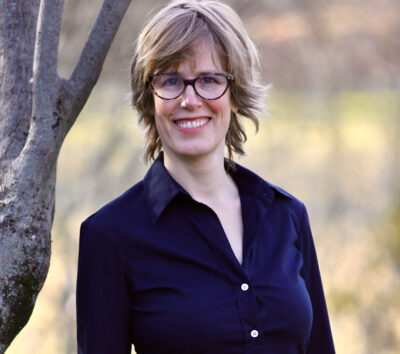
PHOTO BY CHAD KRAUS
Nicole Asquith has seen Pleasantville’s future, and it is renewable.
Asquith cares deeply about the town, so she’s doing everything she can to help reduce the village’s carbon emissions, to ensure a good life for Pleasantville’s future generations.
Asquith, a village trustee, currently serving a third three-year term, is the village board liaison to the town’s Climate Smart Task Force, the Conservation Advisory Council, the Pleasantville Recycles Committee, and the Pedestrian Committee.
The village has taken several steps to reduce its carbon emissions, including converting its street lights to LED lamps, which use much less carbon than incandescent bulbs, reducing electricity usage, lowering Pleasantville’s utility bill.
She’s working to help the village government transition to electric vehicles. The town recently purchased a Ford F-150 Lightning truck for the parks and recreation department, with the help of a $10,000 grant from New York State. The village is helping the department to buy electric landscaping equipment, including electric leaf blowers and a ride-on mower.
Pleasantville’s Climate Smart Task Force instituted a rebate program for residents to hand in their gas-powered leaf blowers, lawn mowers, snow blowers, and weed whackers/trimmers and purchase electric units, getting partial reimbursement of $125, or 50 percent of the cost of a lawnmower, or $75, or 50 percent for a leaf blower, whichever amount is less.
Residents who don’t own a gas-powered lawn mower or snow blower, and who want to buy a new electric unit, can get a rebate of $75, or 50 percent off for their new purchase, whichever is less.
Residents have turned in 56 lawn mowers, nine leaf blowers, eight weed whackers, and six snow blowers, for a total of 79 rebates paid.
Asquith was the driving force in getting the village to enroll in a community solar program.
“Community solar customers typically subscribe to – or in some cases own – a portion of the solar energy generated by a solar array and receive an electric bill credit for electricity generated by their share of the community solar system,” the U.S. Environmental Protection Agency website states. Community solar programs enable subscribers to support local renewable energy while earning up to 10 percent of their electric bills.
“A lot of people can’t do solar,” Asquith said. With community solar, “you subsidize creation of solar generated electricity. You are increasing the amount of solar energy in the system.” Community solar “allows the increase of production of solar energy. It saves money on your energy bill.”
Working with the town’s Climate Smart Task Force and the Mt. Pleasant Conservation Advisory Council (CAC), Asquith and others in the village presented an educational event at the local library in the Spring, 2023, to promote geothermal heat pumps, reducing homeowners’ energy use, and improving their insulation. Installing geothermal heat pumps allows homeowners to heat and cool their homes more cheaply, because the pumps use no fossil fuels and require less electricity than traditional methods.
Asquith and other members of the town’s committees have also presented events on conducting home energy audits to find ways to save money on energy costs and help residents lower their carbon emissions. One of the easiest, cheapest things homeowners can do is participate in the town’s composting program, Asquith said.
“Composting reduces the waste stream, so less goes to the incinerator,” she explained. Pleasantville’s program allows residents to compost meat and bones, which you can’t compost in your backyard, because animals may get to them.
Composting’s benefits include “returning nutrients into the Earth,” Asquith pointed out. “You’re completing a cycle nature used to do on its own.”
In 2021, the first year of the program, the village composted 41.1 tons. In 2022, 41.9 tons was composted. The approximate 2023 figure is 42.8 tons.
Asquith is working on increasing the town’s tree canopy too. “Increased heat means trees are increasingly important,” she said. “Ideally, more trees” are needed in the village, Asquith explained. “Part of the identity of Pleasantville is it’s a leafy village. Trees give shade. They also capture carbon. Native trees support a lot of different species – caterpillars, moths, butterflies. They’re important components of the food web for birds. Baby birds eat hundreds of caterpillars.”
Asquith, who has a doctorate in French literature, is also a podcaster, with a program called “In The Weeds,” https://podcasts.apple.com/us/podcast/in-the-weeds/id1467455250, focusing on “how culture shapes our relationship to the natural world.” She has interviewed scientists, artists, cultural critics, and theologians. “In doing our part to address climate change here in Pleasantville, we’re helping to secure a safe and sustainable future for our children and generations to come.,” she stated. “Pleasantville is a uniquely caring community, in which we all pitch in to help each other. Taking action to address climate change is part of this effort – it’s a responsibility we owe to safeguard the future of this community we love.”
